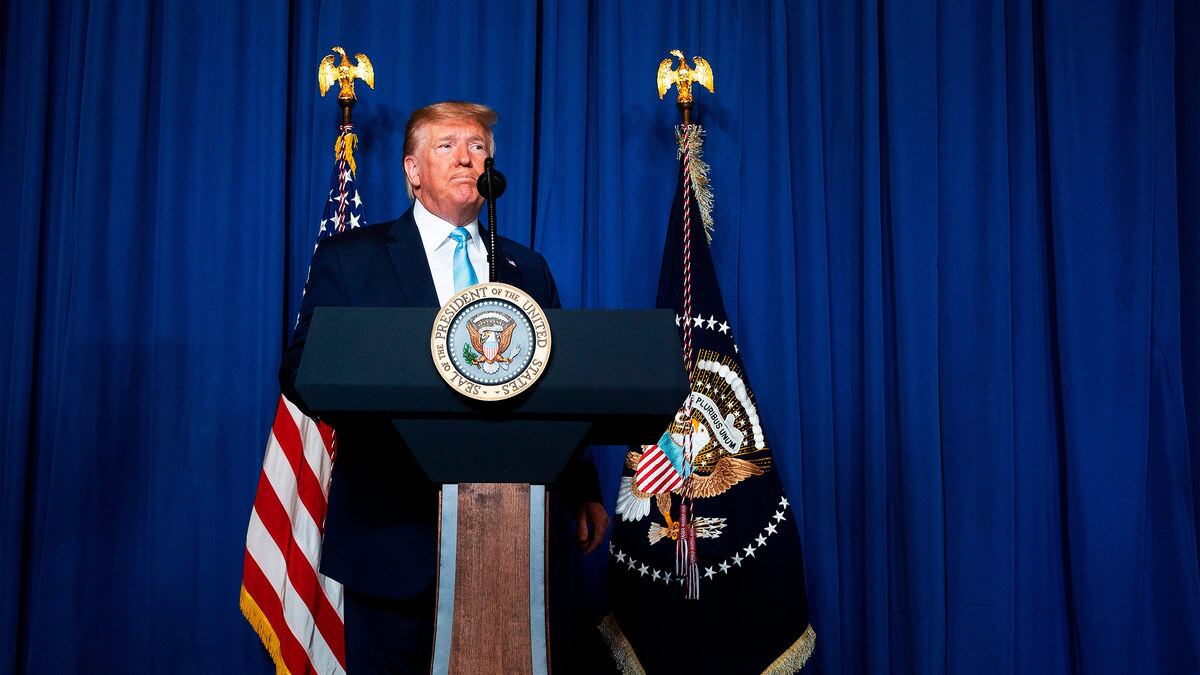The sentiment started bubbling among Democrats almost instantly after news broke that President Donald Trump had ordered the killing of Iranian general Qassem Soleimani: that it was all too convenient, on the eve of an impeachment trial that would decide his presidency, that Trump would make a brazen foreign policy move that effectively shoved impeachment out of the news cycle.
But as more details came out about the strike—or, more importantly, did not come out—mainstream Democratic Party figures were raising the suggestion that Trump brought the U.S. to the brink of war with a dangerous adversary with his own personal political considerations in mind.
Two days after the killing, Sen. Elizabeth Warren (D-MA) said on Meet the Press “we know Donald Trump is very upset about this coming impeachment trial… But look at what he’s doing now. He is taking us to the edge of war.” And on Jan. 3, the day it happened, Rep. David Cicilline (D-RI) tweeted, without comment, a poster for the 1997 film Wag the Dog, in which political operatives working for the White House concoct a fake war in order to distract the public from a sex scandal involving the president.
“He’s either a really bad decision-maker, or, this certainly does help provide a little relief from impeachment news,” said Rep. Mark Pocan (D-WI) after a briefing Wednesday. “Whenever a nation is potentially at war, going after someone who’s a traditional enemy of the people, so to speak, certainly makes us wonder what the real rationale was.”
By Friday, that suspicion was fueled further with a story in the Wall Street Journal that reported Trump had admitted to feeling pressure from GOP senators—his jury in an impeachment trial—to go after Soleimani.
Between the lack of satisfactory answers from the administration in hours of classified briefings and its constantly changing public narrative, congressional Democrats were openly entertaining the idea that by killing Soleimani, Trump had wagged the dog himself—creating a high-profile military spectacle in order to distract from a scandal.
“Let me just say it this way,” said Rep. Dan Kildee (D-MI) after one briefing. “Nobody walked out of that meeting knowing anything more than they walked in knowing. And the idea that either the intelligence was so thin or none existed, that raises the question as to what their motivation was, why did they pick that moment—and this is an administration that has earned the reputation of being willing to do anything at all to defend themselves.”
That open suspicion speaks to the profound lack of trust between congressional Democrats and the White House in a remarkable political moment in which dramatic military escalation with Iran has collided with a scorched-earth impeachment process. Fueling Democrats’ suspicions is the nature of that impeachment, which is centered on charges that Trump abused the power of his office for his own political gain.
In pressuring Ukraine for political favors, said Rep. Eric Swalwell (D-CA), the president “put his interests above the national interest. And there are questions about whether that’s what he did here with Iran.”
Some Democrats, however, were wary of wading further into conjecture. “I try not to speculate without at least some, you know, concrete understanding,” said Rep. Adam Smith (D-WA), the chairman of the House Armed Services Committee.
“Personally, I think the policy decision was bad enough on its own,” Smith added. “That’s what we should focus on. The motivation—who knows, and if we don’t have evidence of that, speculation I don’t think helps our argument.”
The White House declined to comment for this story.
Since killing Soleimani, administration officials have made the case to Capitol Hill and to the public that the general—who controlled the elite, transnational Iranian military unit known as the Quds Force—posed an imminent threat to U.S. soldiers and interests in the Middle East that required urgent, drastic action.
That case has not been consistent, however. Appearing on all five major Sunday shows the weekend before, Pompeo only revealed that Soleimani was “actively engaged and plotting against American interests.” On Thursday, Pompeo told Fox News’ Laura Ingraham that the threat posed by Soleimani was real but “we don't know precisely when and we don't know precisely where.”
But by Friday, Secretary of State Mike Pompeo claimed at a White House press briefing that the U.S. “had specific information on an imminent threat, and those threats from him included attacks on U.S. embassies. Period. Full stop.” Later that day, Trump himself divulged to Fox that Soleimani had supposedly targeted four U.S. embassies overseas, though he declined to name which ones.
Democratic lawmakers say they are still eager to learn more about the administration’s specific rationale in confronting Iran. They may have more opportunities, as relevant committees schedule new briefings from administration officials.
“I think people are suspicious of the motives,” said Rep. Raja Krishnamoorthi (D-IL) on Friday, “but I still hold out hope that I’m gonna learn more.”
But for many Democrats, the last three years have shown them that there is no depth to which this president will not sink—meaning that, until proven otherwise, the question of whether Trump wagged the dog on Iran is a fair one to raise.
“Do I dismiss it out of hand?” asked Rep. Gerry Connolly (D-VA). “No. Trump being Trump, no. You can’t dismiss anything out of hand. Anything’s possible with this guy.”






